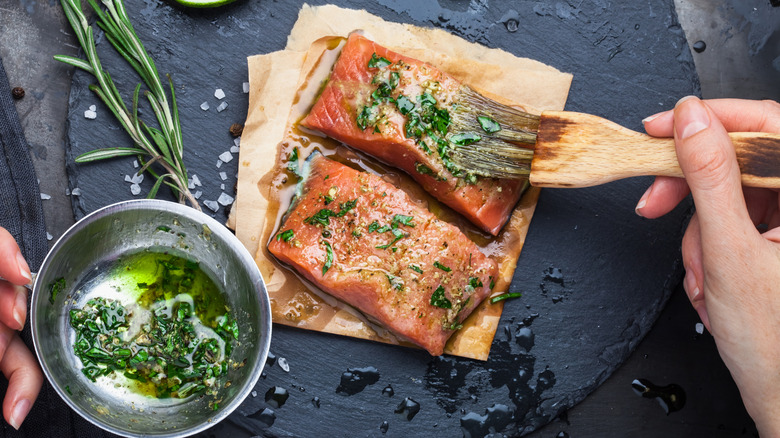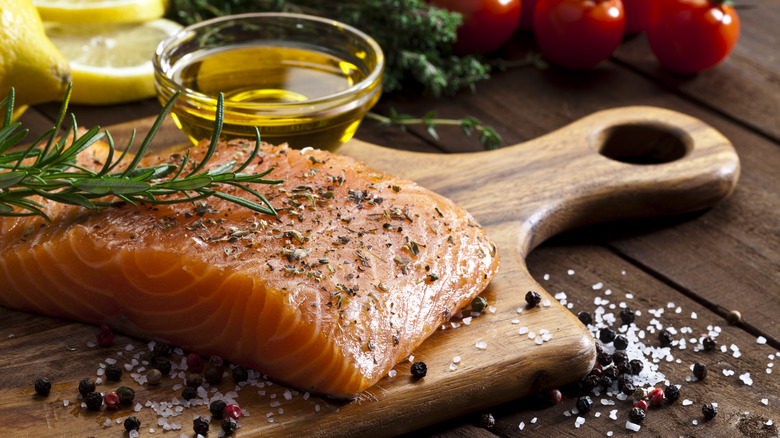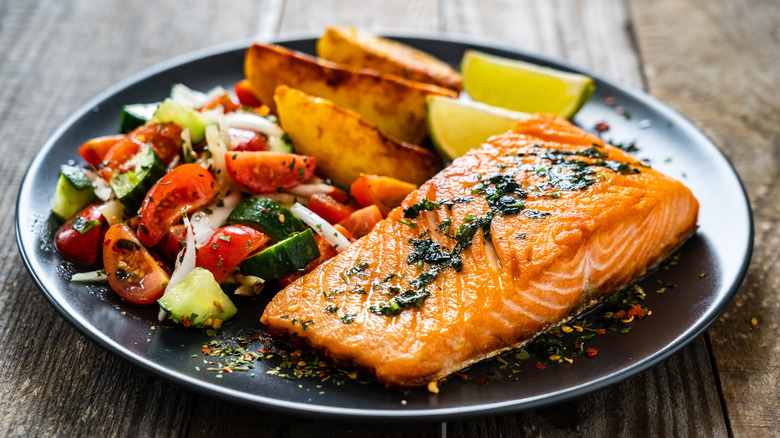The Salmon Marinating Mistake To Avoid At All Costs
Salmon is probably the most accessible fish out there; a delicious, mild seafood that is great even for beginners — although it's also great even for those who enjoy more adventurous seafood endeavors. But its universality and the fact it's so versatile mean even experienced home cooks often make a lot of mistakes with it. They might forget to remove the pin bones, cook it well done, or cook wild-caught salmon in the same amount of time as farm-raised. Or they might simply marinate it for too long.
Wait, is marinating too long a problem? Doesn't marinating for extra time just impart more flavor? Well, not really. In fact, with salmon specifically, marinating for too long can destroy a fish's texture, particularly if it's heavy in acid like citrus or vinegar. This is because the acid starts to break down the flesh of the fish, ultimately turning it to mush — and if you're using citrus, it actually causes it to be overcooked, too.
Marinating seafood for too long breaks it down
In order to understand why this happens, it's important to understand what marinades actually do from a scientific standpoint. Everyone knows one point of a marinade is to add a nice pop of flavor to the outside of another food (although the flavor won't penetrate deep into the meat, so it's better to use a thinner cut). But that's not the only purpose of marinades; they also tenderize meat as the acid or sugar enzymes break down the meat's connective surface proteins. Fruit juice marinades will have even more of an effect here than acids, but even an acid will tenderize the outside of a protein. When it comes to something like steak, pork, or chicken, this breakdown is what you want, as it results in an extremely tender dinner. But fish is a lot softer than beef or chicken to begin with, and too much of this breakdown is going to turn it into absolute mush.
That's not even mentioning the other problem: It's going to make it overcooked if you're using any type of citrus like lemon or lime juice. See, citrus has a specific effect on seafood where it "cooks" it without heat; this principle is the entire concept behind ceviche. If you cook it on top of that, it's likely to wind up overcooked.
How do you effectively marinate salmon?
So, can you get around this problem by not using an acid? Well, sure, but that kind of defeats the entire point of a marinade. Any marinade will have some acid; the whole point is to balance it between acid, oil, and salt. It would be a mistake to leave acid out of your marinade altogether. Instead, you simply need to pay attention to the timing. If your marinade is particularly acid-heavy in something like lime juice, you only want to let your salmon sit in it for 20-30 minutes. If you're using a lesser acid like soy sauce (a common choice for salmon marinades), you can go up to an hour, but you still shouldn't go beyond that. You definitely never want to marinate your salmon overnight.
Ultimately, preparing salmon is like successfully preparing any other protein; it's all about knowing how to treat it. It just so happens that salmon will be more sensitive to acid than, say, a pork loin or a ribeye steak.


